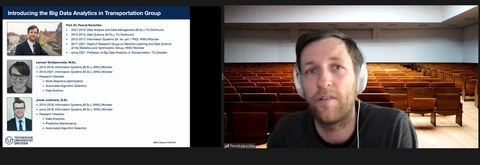Jun 10, 2021
Guest lecture by Prof. Kerschke on the Potential of Automated Machine Learning for the Transition of Mobility

Prof. Kerschke and the team of the new Chair of Big Data Analytics in Transportation
In mobility research, one is regularly confronted with different types of optimization problems. For instance, logistics companies are interested in the shortest possible delivery routes, engineers are working on efficient low-emission fuels and engines, and transportation companies strive for good accessibility and coverage of car- and bikesharing services.
Regardless of the underlying optimization problem, there usually exist several algorithms that are capable of finding (close to) optimal solutions for the problem at hand. However, depending on the structure of the optimization problem (e.g., varying road networks, landscapes, etc.), different algorithms will perform "best" because they have different strengths and weaknesses. In fact, in most problem domains, there is no algorithm that is superior to all its competitors across all instances in that domain. Consequently, choosing the "right" algorithm is a challenging task in itself, as "wrong" choices can have severe effects on the overall performance. The lack of absolutely dominant algorithms means that it is now up to the user to choose a suitable algorithm. To relieve the user of this burden, numerous automated and data-driven methods have been developed over the years, leading to the research branch of automated algorithm selection. By efficiently combining domain knowledge of human experts with sophisticated complementary optimization algorithms and advanced machine learning methods, this research stream has regularly raised the state of the art in various areas of optimization in recent years.
Since March 15th, 2021, Prof. Pascal Kerschke is holder of the new Chair of Big Data Analytics in Transportation at the »Friedrich List« Faculty of Transport and Traffic Science. On June 11th, 2021, the committed researcher introduced the general concept of automated algorithm selection to the team of the Boysen-TU Dresden Research Training Group, and he described the status quo in two optimization domains that are highly relevant for mobility research.
Prof. Kerschke concluded his presentation with an outlook on future research especially with a focus on (data-driven) automation, digitization, and big data analytics.
